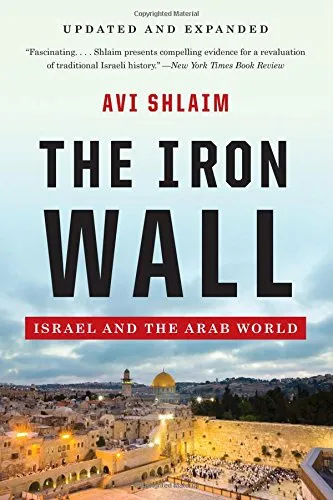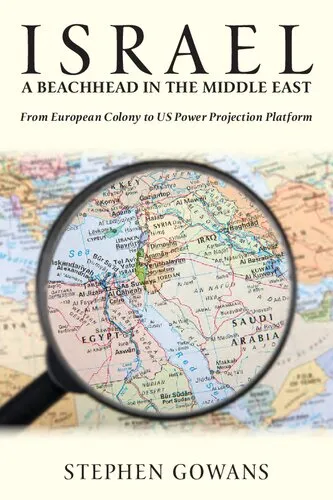The Iron Wall: Israel and the Arab World
4.5
بر اساس نظر کاربران

شما میتونید سوالاتتون در باره کتاب رو از هوش مصنوعیش بعد از ورود بپرسید
هر دانلود یا پرسش از هوش مصنوعی 2 امتیاز لازم دارد، برای بدست آوردن امتیاز رایگان، به صفحه ی راهنمای امتیازات سر بزنید و یک سری کار ارزشمند انجام بدینکتاب های مرتبط:
معرفی کتاب "The Iron Wall: Israel and the Arab World"
کتاب The Iron Wall: Israel and the Arab World نوشته پروفسور "آوی شلایم" یکی از معتبرترین و جامعترین تحلیلهای تاریخی از روابط پیچیده و پرچالش میان اسرائیل و کشورهای عربی است. این کتاب بهطور خاص، استراتژی اسرائیل در قبال همسایگان عرب خود را از زمان تأسیس این کشور تا امروز بررسی کرده و بر نقش ایدئولوژی Iron Wall در شکلدهی سیاست خارجی اسرائیل تمرکز دارد. این مقدمه به شما درک عمیقتری از موضوعات مطرح شده در کتاب و اهمیت آن در مطالعات خاورمیانه خواهد داد.
خلاصهای از کتاب
کتاب The Iron Wall در ابتدا به تشریح مفهوم "دیوار آهنی"، ایدهای که زیربنا و اساس سیاست خارجی اسرائیل در برابر کشورهای عربی بوده است، میپردازد. این مفهوم که توسط Ze'ev Jabotinsky پیشنهاد شده، بر این عقیده تأکید دارد که تنها از طریق نمایش قدرت نظامی و غیرقابلنفوذ بودن است که اسرائیل میتواند صلحی ماندگار با همسایگان عرب خود ایجاد کند.
شیوه روایت کتاب بر اساس ترتیب زمانی است و در هر فصل به مقاطع کلیدی در تاریخ روابط اسرائیل و جهان عرب از ۱۹۴۸ تا دهه معاصر میپردازد. نویسنده تلاش میکند تا با استفاده از شواهد اسناد تاریخی، سیاستهای هر دو طرف را بیطرفانه تجزیه و تحلیل کند. کتاب به جنگهای مختلف، مذاکرات صلح و نقش قدرتهای جهانی در این منازعات نگاه جامعی دارد.
نکات کلیدی کتاب
- تحلیلی عمیق از مفهوم Iron Wall و تأثیر آن بر سیاست خارجی اسرائیل.
- بررسی روابط تاریخی میان اسرائیل و کشورهای عربی با ارجاع به اسناد غیرقابل انکار و معتبر.
- تحلیل جنگها و پروسههای صلح میان اسرائیل و فلسطینیها.
- بازتاب تأثیر قدرتهای بزرگ مانند ایالات متحده و بریتانیا بر تحولات منطقهای.
- تلاشی مستند برای شکافتن روایتهای متناقض موجود در فضای سیاسی خاورمیانه.
جملات معروف کتاب
"The path to peace does not lie in unilateralism or domination, but in mutual recognition and compromise."
"Israel's security strategy, which centered on the concept of the Iron Wall, has been key to shaping its relations with its neighbors."
چرا این کتاب مهم است؟
کتاب The Iron Wall نه تنها برای محققین و دانشجویان حوزه مطالعات خاورمیانه حیاتی است، بلکه برای هر فردی که به درک سیاستهای خاورمیانه و اهمیت روابط اسرائیل و کشورهای عربی علاقهمند است نیز الزامی است. آوی شلایم، بهعنوان یکی از اعضای برجسته "New Historians" در اسرائیل، از روایتهای سنتی فاصله گرفته و با استفاده از منابع آرشیو شده و تحلیلهای منتقدانه خود، خوانندگان را به تفکر عمیقتر درباره دلایل تاریخی و پیامدهای سیاستهای اسرائیل سوق میدهد.
این کتاب توانسته پلی میان تحقیق آکادمیک و روایت مستند ایجاد کند و مفاهیم کلیدی همچون صلح، قدرت نظامی، و تعامل دیپلماتیک در منطقهای پر از تنش و درگیری را به زبانی روشن و علمی منتقل کند.
Introduction to "The Iron Wall: Israel and the Arab World" by Avi Shlaim
"The Iron Wall: Israel and the Arab World" by Avi Shlaim is a seminal work that delves deeply into the complex and tumultuous relationship between Israel and its Arab neighbors throughout the 20th century and beyond. First published in 2000 and revised in subsequent editions to provide updated analyses, this book explores the political ideology, historical events, and regional dynamics that have defined one of the most intractable and consequential conflicts of our time. Renowned for its rigor, objectivity, and incisiveness, this book has become a cornerstone in the field of Middle Eastern studies.
Detailed Summary of the Book
At its core, "The Iron Wall" traces the historical trajectory of Zionism and Israel’s policies toward the Arab world from the early 20th century to the modern era. The title itself refers to the "Iron Wall" strategy articulated by Ze’ev Jabotinsky in the 1920s—a philosophy advocating for the establishment of a strong and secure Jewish homeland before reaching any form of compromise or peace with the Arab world. Shlaim builds upon this concept, examining how this doctrine has influenced successive Israeli governments and their policies.
The book is divided into chronological sections, each scrutinizing pivotal moments in history: from the British Mandate in Palestine, the UN Partition Plan, the Arab-Israeli wars of 1948, 1967, and 1973, to the Camp David Accords, the Oslo Peace Process, and beyond. Shlaim evaluates Israeli foreign policy, shedding light on the critical decisions and missteps that have perpetuated cycles of conflict. Through meticulous research and a wealth of primary sources, he also critiques the role of Arab states, demonstrating that peace remained elusive due to a combination of mistrust, internal divisions, and entrenched positions on both sides.
The book unearths hidden details about key players such as David Ben-Gurion, Golda Meir, Anwar Sadat, Yitzhak Rabin, and Ariel Sharon. These profiles underscore the intersection between leadership and ideology, emphasizing how decisions taken in moments of crisis shaped—and in many cases hardened—the broader Israeli-Arab conflict.
Key Takeaways
- The "Iron Wall" strategy continues to inform Israeli security doctrine and its foreign policy approach.
- Competing narratives of history significantly contribute to the difficulty of achieving mutual understanding or sustainable peace.
- Internal divisions within both Israeli and Arab societies have played a crucial role in thwarting compromise and progress.
- A nuanced historical understanding is critical to untangling a highly complex and multi-faceted conflict.
- The international community, including Western powers, has often exacerbated regional tensions through uneven policies and interventions.
Famous Quotes from the Book
- "Peace cannot be built on the basis of illusions; it requires a realistic appraisal of the conditions for coexistence."
- "The Iron Wall was not just a policy; it was a state of mind that dominated Israel's approach to its Arab neighbors."
- "History should not be weaponized; it should enlighten our actions rather than justify our prejudices."
- "The Arab-Israeli conflict is not a zero-sum game—it demands recognition of mutual rights and suffering."
Why This Book Matters
"The Iron Wall: Israel and the Arab World" is a masterwork that bridges the gap between historical scholarship and contemporary relevance. It provides readers with not only a comprehensive account of the Arab-Israeli conflict but also the tools to critically assess modern political and diplomatic realities. Shlaim’s objectivity, reinforced by his access to once-classified Israeli and British documents, establishes him as a trustworthy and essential voice in Middle Eastern studies.
This book is particularly significant for students, policymakers, and anyone interested in world affairs. By elucidating the ideological, historical, and human dimensions of the Israel-Arab conflict, Shlaim confronts readers with the daunting complexity of peacemaking in the region. Yet, he also highlights the possibilities for reconciliation if leaders are willing to confront their biases and embrace genuine compromise.
In an era of ongoing instability in the Middle East, "The Iron Wall" remains as pertinent as ever, offering invaluable insights into both the roots of the conflict and the prospects for its resolution.
دانلود رایگان مستقیم
شما میتونید سوالاتتون در باره کتاب رو از هوش مصنوعیش بعد از ورود بپرسید
دسترسی به کتابها از طریق پلتفرمهای قانونی و کتابخانههای عمومی نه تنها از حقوق نویسندگان و ناشران حمایت میکند، بلکه به پایداری فرهنگ کتابخوانی نیز کمک میرساند. پیش از دانلود، لحظهای به بررسی این گزینهها فکر کنید.
این کتاب رو در پلتفرم های دیگه ببینید
WorldCat به شما کمک میکنه تا کتاب ها رو در کتابخانه های سراسر دنیا پیدا کنید
امتیازها، نظرات تخصصی و صحبت ها درباره کتاب را در Goodreads ببینید
کتابهای کمیاب یا دست دوم را در AbeBooks پیدا کنید و بخرید
1376
بازدید4.5
امتیاز50
نظر98%
رضایتنظرات:
4.5
بر اساس 0 نظر کاربران
"کیفیت چاپ عالی بود، خیلی راضیام"
Questions & Answers
Ask questions about this book or help others by answering
No questions yet. Be the first to ask!



